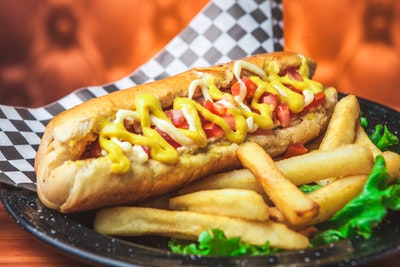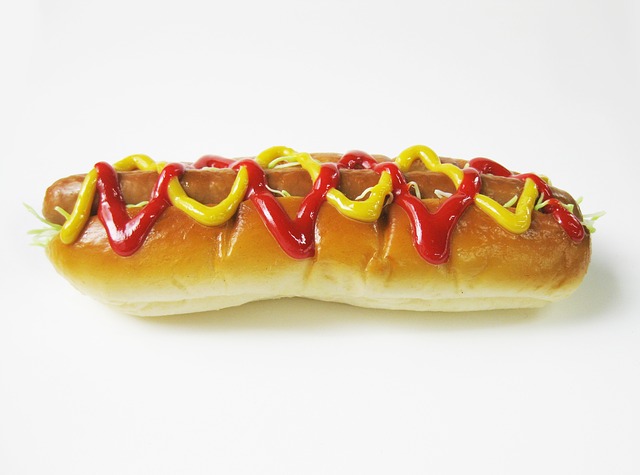Can Dogs Eat Hot Dogs? Is Hot Dogs Good Or Bad For Dogs?
 |
| Can Dogs Eat Hot Dogs? Is Hot Dogs Safe For Dogs? |
Can Dogs Eat Hot Dogs?
Your dog would probably love to swallow a hot dog. But is it a good idea? Hot dogs can be considered as a kind of mysterious meat, full of ingredients that might surprise you or not recognize you. Many of these ingredients can be toxic to dogs.When the barbecue season unfolds, there is at least one weekend in the afternoon where you happily build the perfect hot dog. When you feel a nudge in the knee, you know it's your dog who comes to beg you to nibble on your hot dog. But before giving in to temptation, ask yourself if the hot dog you're about to nibble is safe for your puppy!
If your dog has any unusual symptoms, ask your veterinarian if your dog may be suffering from food allergy or intolerance. Hot dog buns, for example, can trigger a reaction if your dog is sensitive to grain. If your dog consumes onions or garlic, consult a veterinarian immediately.
Why Dogs Can Not Eat Hot Dogs
Barbecues and family gatherings are great fun and a great way to socialize your baby in fur. These social occasions include lots of smells and foods for everyone to enjoy, but are not necessarily the best spread for your dog. Hot dogs can be a choking hazard and a health hazard to your puppy and should be avoided at all times. If your dog is absolutely gaga over, there are some that you can consider as a high reward treat. And if it sneaks one, know that it should as well go long term.
The Root Of The Behavior
Depending on the size of your dog, he may be in the habit of skinning whole foods, especially if he sneaks them or if he drools quietly watching you eat. Due to its size and shape, a hot dog can become a choking hazard to your hungry dog. The mysterious meat can lodge in its throat and, because of its length and its circumference, can fill its passage, blocking any air. Dogs can not tell you that they are choking, and an intact dog can be difficult to remove even with a Heimlich maneuver. Hot dogs are a choking hazard for children, even when cut into small pieces for the same reason. They can be quickly sprained and swallowed with minimal chewing and then lodge in the throat. Hot dogs are fun summer foods enjoyed by everyone. The basic hot dog, however, is full of processed meats, artificial colors, artificial flavors, nitrates, nitrites, and fats. This is more than double the recommended amount per day for a dog weighing about thirty-three pounds. Exceeding the recommended sodium limits may increase your dog's risk of dehydration and put him at risk for cardiovascular disease. The summer treat also often contains ingredients for flavoring, including onion and garlic powders, which can be toxic to dogs. Processed meat tends to be high in fat and calories, the typical hot dog having 300 calories and 17 grams of fat. Neither is recommended for dogs in large quantities, especially those who are older, obese or more sedentary. Hot dogs also tend to come in a roll, and rolls tend to be full of processed carbohydrates and sugar, none of which is recommended for a dog of any age or size. Encourage Behavior There are high-quality meats on the market that are a better option if you want to share your barbecue experience with your puppy. Many organic brands are made from beef or pure pork and do not contain dangerous artificial ingredients in a puppy's digestive system and their quality components balance the potential negative effects of fats and calories.Butchers often make their own sausages and hot dogs on the premises, so be sure to discuss with him the ingredients he has put in the meats before placing them in their casings. You should always avoid any ingredient such as garlic, onions or hot peppers that can cause digestive upset or possible poisoning of your dog's digestive system. Make sure to cook the meat well as the raw meat may also contain bacteria that can make your dog very sick. It is strongly recommended to cut the hot dog in small bites without constriction. Coaches will also recommend that you reserve this meat treat as a valuable reward rather than a daily meal or treat. If your dog starts drinking more water after eating the hot dog, consider using a brand that is lower in sodium. Make sure to provide plenty of water to satisfy the extra thirst for hot dog drinking. Also watch for any intestinal disorders such as constipation or diarrhea, which can occur by ingesting too many processed ingredients at a time. If you are concerned that your dog is choking, contact your veterinarian immediately and take your puppy to an emergency veterinarian near you.
Can You Give Your Dog a Hot Dog?
 |
| Can Dogs Eat Hot Dogs? Is Hot Dogs Safe For Dogs? |
Hot dogs are great for your dog to eat in moderation. Anything highly processed and specially designed for human consumption is never the healthiest thing for your dog, and hot dogs are not something you consider nutritionally healthy. It is probably best for you to feed your dog (and yourself, really) hot dogs made with quality ingredients.
Cheap hot dogs are made with a variety of mystery meat and artificial flavors. Processed hot dogs are delicious, but they are packed with a ton of preservatives and ingredients that are not very good for your dog. Sodium nitrate is a common preservative found in most hot dogs, and research has shown that it is linked to cancer. Many hot dog companies use a variety of seasonings to flavor their foods, such as onions, garlic and lots of salt. Even if it is only onion salt or garlic, it is always toxic to dogs.
Quality hot dogs are made with whole meats like pork, chicken, and turkey, all of which are great for your dog. Hot dogs bought at your local butcher are much healthier for you and your dog, and you can ask your butcher exactly what went into the meat. The gourmet fresh butcher's hot dogs are made with high-quality sausages, so be sure to learn about onions and garlic, as well as the amount of salt in the recipe.
As for rolls, the less bread you give your dog, the better. A few bites here and there are fine, but the processed carbohydrates found in hot dog buns are full of sugar and can make sedentary or elderly dogs gain weight.
Note: If you choose to feed your dog with a hot dog, it is best to give him a regular hot dog, without bread or condiments such as ketchup and mustard, as they add unnecessary extra calories.
Before Feeding Your Dog Hot Dogs:
In addition to potentially toxic ingredients, hot dogs pose a choking hazard. You've seen how your dog slings delicious treats, often skipping the chewing process and swallowing it whole. The shape of the hot dogs is perfect for lodging in their throats, so never give your dog a hot dog that is not cut into manageable pieces.
Hot dogs are also high in fat. If your dog is overweight, diabetic or sedentary for any reason, you must offer him a healthier snack. Some bites are good, but an entire hot dog does not serve an overweight puppy.
Throwing leftover hot dogs in an easily accessible trash is a danger often ignored by many homeowners. The tasty smell will surely attract a nosy dog, and a frenzy on such a high-fat food can result in vomiting, diarrhea or painful inflammation of the pancreas. Throw the leftovers where your dog can not help himself.
When your dog joins you for your barbecue, use discretion before starting to share your food. Remember that your dog feeds on dog food and all the rest has to be given as a rare treat.
Problems With Hot Dogs
 |
| Can Dogs Eat Hot Dogs? Is Hot Dogs Safe For Dogs? |
Many hot dogs contain ingredients that are not good for dogs, such as sodium nitrate, which has been linked to cancer; monosodium glutamate (MSG); and artificial sugars or sweeteners.
The biggest problem with hot dogs is salt. According to the National Academy of Sciences, a dog weighing 33 pounds needs only 200 milligrams (mg) of sodium per day. The average hot dog contains more than 500 mg of sodium, so feeding your dog only half a hot dog would probably put him well above his daily sodium limit.
Feeding a dog too much sodium can result in dehydration. And excess sodium over time can cause high blood pressure, just as it can be in humans.
Another problem with hot dogs is that they present a choking hazard, especially for larger dogs who might try to swallow them without chewing them.
What If Your Dog Hangs a Hot Dog?
 |
| Can Dogs Eat Hot Dogs? Is Hot Dogs Safe For Dogs? |
If your dog is hooking a hot dog while you are not looking, do not panic. One will probably not do any harm. He may have a stomach ache or have other digestive problems, such as diarrhea, but this should happen during the day. You should only call the veterinarian if the diarrhea persists or if you vomit with diarrhea, as this may lead to extreme dehydration.
Make sure your dog has plenty of water available, because all that salt in the hot dog will probably make him thirsty.
What If Your Dog Accidentally Eats a Hot Dog?
If your dog catches a hot dog from the table, do not panic. He should be fine, but keep an eye on him to see if he develops strange symptoms.
Your dog may have a stomach ache or have digestive problems, such as diarrhea. But he should recover fairly quickly.
But if diarrhea persists or your dog vomits diarrhea, call your veterinarian immediately.
Hot dogs are not an ideal treat for feeding your dog. With so many questionable ingredients, it's best to give your puppy a healthier and safer alternative, such as apples, peanut butter or blueberries.
Alternatives To Hot Dogs
 |
| Can Dogs Eat Hot Dogs? Is Hot Dogs Safe For Dogs? |
Because they contain so many added ingredients that are not healthy for dogs, hot dogs are not a good choice for your dog. If you want to please your dog on the barbecue, it is best to give him beef, pork or plain chicken without salt or other seasoning. Be sure to cut the meat into small pieces.
In this way, you know exactly what you are feeding your dog and the risk of choking is minimized.

Comments
Post a Comment